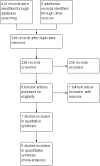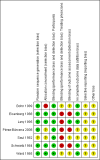Barbiturates for acute traumatic brain injury
- PMID: 23235573
- PMCID: PMC7061245
- DOI: 10.1002/14651858.CD000033.pub2
Barbiturates for acute traumatic brain injury
Abstract
Background: Raised intracranial pressure (ICP) is an important complication of severe brain injury, and is associated with high mortality. Barbiturates are believed to reduce ICP by suppressing cerebral metabolism, thus reducing cerebral metabolic demands and cerebral blood volume. However, barbiturates also reduce blood pressure and may, therefore, adversely effect cerebral perfusion pressure.
Objectives: To assess the effects of barbiturates in reducing mortality, disability and raised ICP in people with acute traumatic brain injury. To quantify any side effects resulting from the use of barbiturates.
Search methods: The following electronic databases were searched on 26 September 2012: CENTRAL (The Cochrane Library), MEDLINE (Ovid SP), PubMed, EMBASE (Ovid SP), PsycINFO (Ovid SP), PsycEXTRA (Ovid SP), ISI Web of Science: Science Citation Index and Conference Proceedings Citation Index-Science. Searching was not restricted by date, language or publication status. We also searched the reference lists of the included trials and review articles. We contacted researchers for information on ongoing studies.
Selection criteria: Randomised controlled trials of one or more of the barbiturate class of drugs, where study participants had clinically diagnosed acute traumatic brain injury of any severity.
Data collection and analysis: Two review authors screened the search results, extracted data and assessed the risk of bias in the trials.
Main results: Data from seven trials involving 341 people are included in this review.For barbiturates versus no barbiturate, the pooled risk ratio (RR) of death from three trials was 1.09 (95% confidence interval (CI) 0.81 to 1.47). Death or disability, measured using the Glasgow Outcome Scale was assessed in two trials, the RR with barbiturates was 1.15 (95% CI 0.81 to 1.64). Two trials examined the effect of barbiturate therapy on ICP. In one, a smaller proportion of patients in the barbiturate group had uncontrolled ICP (68% versus 83%); the RR for uncontrolled ICP was 0.81 (95% CI 0.62 to 1.06). In the other, mean ICP was also lower in the barbiturate group. Barbiturate therapy results in an increased occurrence of hypotension (RR 1.80; 95% CI 1.19 to 2.70). For every four patients treated, one developed clinically significant hypotension. Mean body temperature was significantly lower in the barbiturate group.In one study of pentobarbital versus mannitol there was no difference in death between the two study groups (RR 1.21; 95% CI 0.75 to 1.94). Pentobarbital was less effective than mannitol for control of raised ICP (RR 1.75; 95% CI 1.05 to 2.92).In one study the RR of death with pentobarbital versus thiopental was 1.78 (95% CI 1.03 to 3.08) in favour of thiopental. Fewer people had uncontrollable ICP with thiopental (RR 1.64; 95% CI 1.03 to 2.60). There was no significant difference in the effects of pentobarbital versus thiopental for death or disability, measured using the Glasgow Outcome Scale (RR 1.31; 95% CI 0.88 to 1.94), or hypotension (RR 0.95; 95% CI 0.81 to 1.12).
Authors' conclusions: There is no evidence that barbiturate therapy in patients with acute severe head injury improves outcome. Barbiturate therapy results in a fall in blood pressure in one in four patients. This hypotensive effect will offset any ICP lowering effect on cerebral perfusion pressure.
Conflict of interest statement
None known.
Figures
















Update of
-
Barbiturates for acute traumatic brain injury.Cochrane Database Syst Rev. 2000;(2):CD000033. doi: 10.1002/14651858.CD000033. Cochrane Database Syst Rev. 2000. Update in: Cochrane Database Syst Rev. 2012 Dec 12;12:CD000033. doi: 10.1002/14651858.CD000033.pub2. PMID: 10796689 Updated.
References
References to studies included in this review
Bohn 1989 {unpublished data only}
-
- Bohn DJ, Swan P, Sides C, Hoffman H. High‐dose barbiturate therapy in the management of severe paediatric head injury: a randomised controlled trial. Critical Care Medicine 1989;S118:17.
Eisenberg 1988 {published data only}
-
- Eisenberg HM. Protocol request [personal communication]. Email to: E Sydenham 12 November 2012.
-
- Eisenberg HM, Frankowski RF, Contant CF, Marshall LF, Walker MD. High dose barbiturate control of elevated intracranial pressure in patients with severe head injury. Journal of Neurosurgery 1988;69:15‐23. [MEDLINE: ] - PubMed
Levy 1995 {published data only}
-
- Levy ML, Aranda M, Zelman V, Giannotta SL. Propylene glycol toxicity following continuous etomidate infusion for the control of refractory cerebral edema. Neurosurgery 1995;37:363‐71. [MEDLINE: ] - PubMed
Pérez‐Bárcena 2008 {published data only}
-
- Perez‐Barcena J, Llompart‐Pou JA, Homar J, Abadal JM, Raurich JM, Frontera G, et al. Pentobarbital versus thiopental in the treatment of refractory intracranial hypertension in patients with traumatic brain injury: a randomized controlled trial. Critical Care 2008;12(4):R112. [DOI: 10.1186/cc6999; http://ccforum.com/content/12/4/R112] - DOI - PMC - PubMed
-
- Pérez‐Bárcena J, Barceló B, Homar J, Abadal JM, Molina FJ, Pena A, et al. Comparison of the effectiveness of pentobarbital and thiopental in patients with refractory intracranial hypertension. Preliminary report of 20 patients. Neurocirugia (Astur) 2005;16(1):5‐12. [DOI: 10.1186/cc6999] - DOI - PubMed
Saul 1982 {unpublished data only}
-
- Saul TG, Ducker TB. Effects of intracranial pressure monitoring and aggressive treatment on mortality in severe head injury. Journal of Neurosurgery 1982;56:498‐503. [MEDLINE: ] - PubMed
Schwartz 1984 {published data only}
-
- Schwartz ML. Protocol request [personal communication]. Email to: E Sydenham 11 November 2012.
-
- Schwartz ML, Tator CH, Rowed DW, Reid SR, Meguro K, Andrews DF. The University of Toronto Head Injury Treatment Study: A prospective randomized comparison of pentobarbital and mannitol. Canadian Journal of Neurological Science 1984;11:434‐40. [MEDLINE: ] - PubMed
Ward 1985 {published data only}
-
- Ward JD, Becker DP, Miller JD, Choi SC, Marmarou A, Wood C, et al. Failure of prophylactic barbiturate coma in the treatment of severe head injury. Journal of Neurosurgery 1985;62:383‐8. [MEDLINE: ] - PubMed
-
- Ward JD, Miller JD, Choi SC, Marmarou A, Lutz, HA, Newlon PG, et al. Failure of prophylactic barbiturate coma in the prevention of death due to uncontrolled intracranial hypertension in patients with severe head injury. In: Miller JD, Teasdale GM, Rowan JO, Galbraith SL, Mendelow AD editor(s). Intracranial Pressure. Vol. VI, Springer‐Verlag, 1986:766‐8.
References to studies excluded from this review
Yano 1981 {published data only}
-
- Yano M, Kobayashi S, Aruga T, Yamamoto Y, Ohtsuka T, Nishimura N. Barbiturate overloading in 85 cases of severe head injury. Neurologia Medico‐Chirurgica 1981;21:163‐70. - PubMed
Additional references
Ghajar 1995
-
- Ghajar J, Hariri RJ, Narayan RK, Iacono LA, Firlik K, Patterson RH. Survey of critical care management of comatose, head‐injured patients in the United States. Critical Care Medicine 1995;23(3):560‐7. - PubMed
Higgins 2011
-
- Higgins JPT, Green S (editors). Cochrane Handbook for Systematic Reviews of Interventions Version 5.1.0 [updated March 2011]. The Cochrane Collaboration, 2011. Available from www.cochrane‐handbook.org.
Jeevaratnam 1996
Jennet 1975
-
- Jennett B, Bond M. Assessment of outcome after severe brain damage. A practical scale. Lancet 1975;1:480‐4. - PubMed
MECIR 2012
-
- The Cochrane Collaboration. Methodological Expectations of Cochrane Intervention Reviews (MECIR): Standards for the reporting of new Cochrane Intervention Reviews. Cochrane Editorial Unit 2012. [www.editorial‐unit.cochrane.org/mecir]
Pickard 1993
Schultz 1995
-
- Schulz KF, Chalmers I, Hayes RJ, Altman DG. Empirical Evidence of Bias. Dimensions of methodological quality associated with estimates of treatment effects in controlled trials. JAMA 1995;273:408‐12. - PubMed
Shapiro 1979
-
- Shapiro MH, Wyte SR, Loeser J. Barbiturate augmented hypothermia for reduction of persistent intracranial hypertension. Journal of Neurosurgery 1979;40:90‐100. - PubMed
References to other published versions of this review
Roberts 1997
-
- Roberts I. Barbiturates in the management of severe brain injury. Cochrane Database of Systematic Reviews 1997, Issue 3. [DOI: 10.1002/14651858.CD000033] - DOI
Publication types
MeSH terms
Substances
LinkOut - more resources
Full Text Sources

